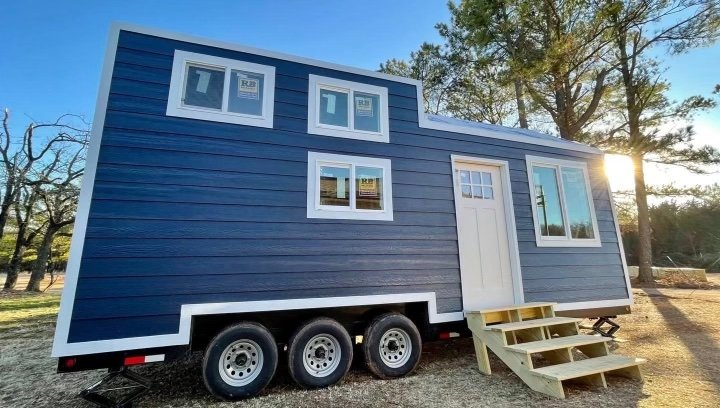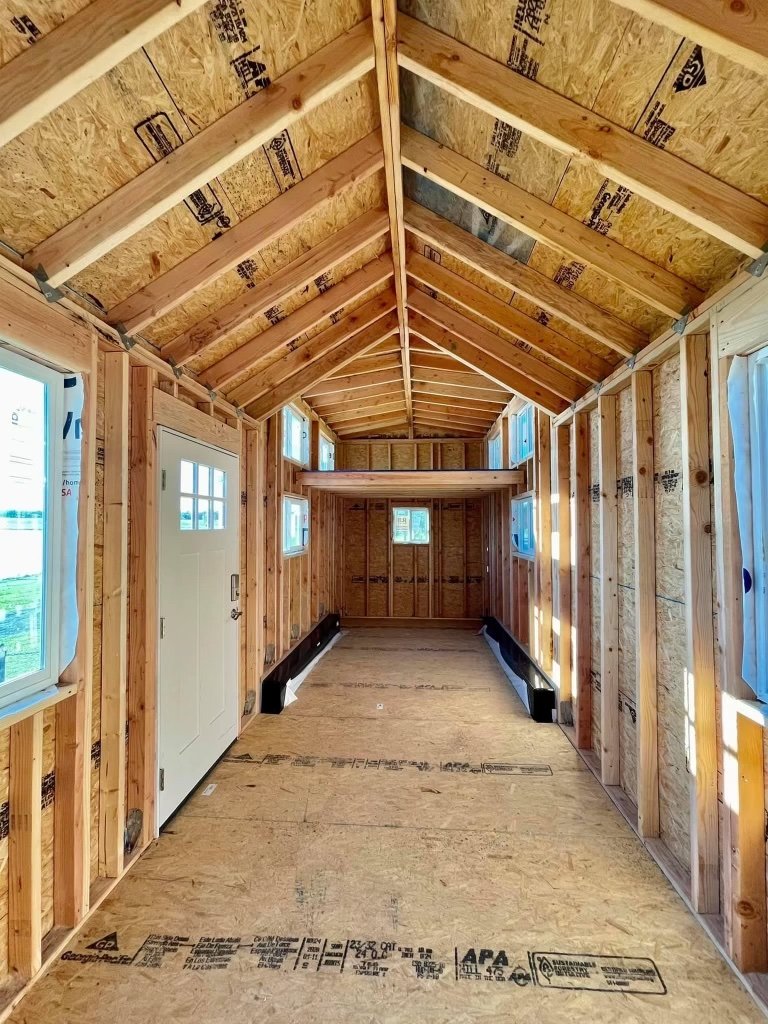The theme of most students' college years is that of very empty bank accounts and lifestyles to go along with them, but a few friends of mine are unique in that to say the least. Here's an article I wrote about their latest business adventure:

Photo by Garrett Gilliland.
College students threaten each other’s lives every day, but how often do those threats lead to a genuine friendship and business partnership? For Garrett Gilliland and Nathan Weida, the odds did not stand a chance, and thus, Freedom Building Company was born.
Years before Freedom Building Company, middle school aged Garrett Gilliland says he would often camp out on his family’s acreage, enthralled in the idea of living on his own and venturing to see the rest of the world.
“After a while of doing that, I decided I definitely didn’t want to live in a tent my whole life, so then that just transferred over,” Gilliland says. “A tiny house is about as minimalistic as you can get.”
Gilliland carried an interest in tiny living to his high school construction classes, where he says he begged one of his instructors to let the class build a tiny house. While the instructor did not assign his students the project until after he graduated, Gilliland says a quaint tiny home still stands behind the Meridian Technology Center in Stillwater, Oklahoma, a landmark to the beginning of his extensive journey in tiny construction.
As Gilliland familiarized himself with power tools and two-by-fours in construction competitions, Nathan Weida was learning the inner workings of engines through 10 years of sprint cart racing. He said there he found a passion for problem solving through his experiences and went on to pursue a degree in mechanical engineering.
Older students recruited Weida to help with construction projects just a few months into his college years. He found this new hobby to be the perfect way to make money and keep a flexible schedule, and he says he adapted his former career plans to this newfound passion.
“I didn’t even know construction engineering was a degree until I went to my counselor to tell him what I was doing just wasn’t working,” Weida says. “I knew I should have been doing that all along.”
Weida added that he kept up his construction hobby as he fell in love with his new classes. He painted houses, laid tile, and even started building sheds from his church’s parking lot, the same location where Weida and Gilliland met for the first time. Gilliland described the encounter and the way Weida terrified him with his habit of speeding an average of 25 mph over the limit. Weida proved to carry that same drive into his construction projects, an attribute Gilliland says they have always shared.
The two first partnered on small construction projects, working anywhere from their church’s parking lot to Gilliland’s parents’ house.
“We’ve provided the space and these guys have been focused and driven to tackle every project,” says Jeff Gilliland, Garrett’s father. “After seeing their work, we have even contracted them for projects on our home.”
They grew their venture to the tiny house industry after coming across an unfinished frame on Facebook Marketplace in March 2019. $800 and a few days of hard work later, he said they found an interested buyer. The customer agreed to a meeting time, shortly after which the boys said they were reminded of the unpredictability of tornado season in Oklahoma. They worked through the night to correct the damage done by nearly 40 mph wind speeds and sold the shell the following day.
“I’d probably do it again,” Gilliland says. “Unfortunately, we have worked all night several times since then.”
Weida and Gilliland credit much of their knowledge to the challenges they faced early on in their business venture. They purchased a second frame a few months later and said they started to notice the untapped potential of the tiny house market in the region. They emersed themselves in research until they said they had spoken with nearly everyone in the state who had been around the construction of tiny homes.
“There’s not too many tiny houses in this area and certainly not the number of builders to support the market that we think could grow here,” Weida says.

Photo by Garrett Gilliland
The two are wrapping up finishing touches on their fourth tiny house and the first ground-up build for Freedom Building Company, he added. In their research, they found a unique vendor that builds trailers equipped with steel channels that provide a secure attachment for the frame of the house. The structure stands at 13 feet long by 8 feet wide, and they placed windows which shower natural light down on every square foot. They adorned the outside with deep navy siding, white trim, and an aluminum roof. Weida says they plan to sell this one as a shell, building up capital for fully functioning homes down the road.
Weida and Gilliland say they initially connected over a shared drive to make money through unique projects, and they have found the tiny house industry provides the perfect means. Churning one tiny house out a month would give both of them a solid income, Weida added. Gilliland, a nonprofit management student, explained they are also working to build an additional house each year to be donated to someone in need. They are both very business-minded and have enlisted whoever necessary to assist on projects over the years.
“Nathan and Garrett are both incredibly hard workers,” says Cole Roberts, friend and helper of Weida and Gilliland. “They even make things like roofing fun, and roofing is never fun.”
Gilliland says their shared experiences and motivation have brought them close as both business partners and friends. Construction is no easy hobby, and they have managed to balance the challenge of it with full class schedules and outside involvement, he added. Several college students manage a job alongside classes, but few make the time to start an entire business.
“I don’t know how long we’ll chase this thing, but it’s been a great way to learn and grow in this industry,” Weida says. “I know I will come back to the lessons we’re learning throughout my entire career.”